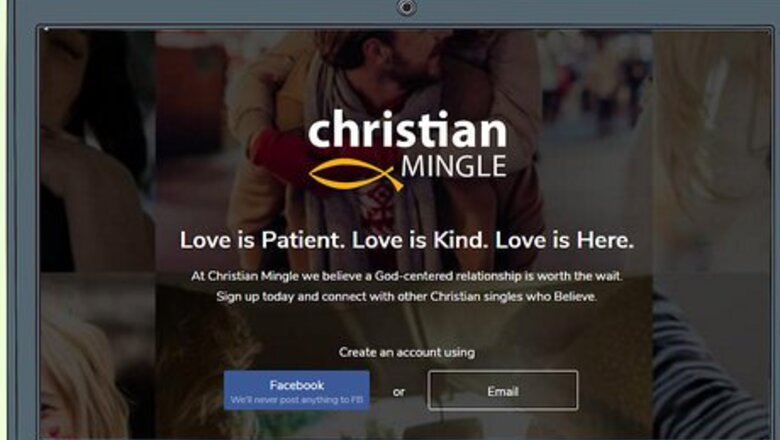
views
Finding Dates
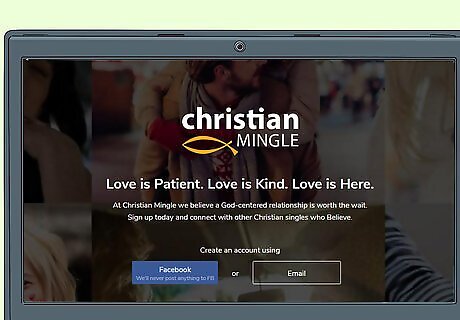
Explore dating apps and websites. Some apps can be tailored to specific demographics and interests, making it even easier to search for a good match! For the best results, create an open and honest profile with accurate images of yourself. Start with just one app or website and take it slow. If you feel overwhelmed at first, try limiting your online browsing to evening hours. Be careful about the photos and details you provide on your dating website. Don't provide too many identifying details that could compromise your safety. Try exploring dating websites like Match.com, eHarmony, and ChristianMingle.com. Dating apps like PlentyofFish, Bumble, Happn, and OKCupid are also good options. When meeting people in real life, make sure that you meet in public.

Check out happy hour at local bars and restaurants. Happy hours are popular with people in their 30s, since it's something they can do right after work and still get home at a reasonable time. Find out where there are good late afternoon drink specials near you, and try hitting a different place each week. If someone catches your eye, smile at them and consider buying them a drink as an icebreaker.

Look for dates where you know other 30-somethings spend time. Skip that dance club full of 20-year-olds, or the dive bar near the university. Instead, go to dinner parties, wine tasting events, gallery openings, and other places that are usually populated by people in your approximate age group. Tailor your conversation to the event if you're looking for conversation starters. For example, if you're at a gallery opening, you can talk about artists you like or recent openings you've attended.

Ask your friends to set you up. These days, a lot of single people are in their 30s. There is a good chance that someone in your social group knows somebody who might be a good fit for you. Meeting people face to face, through mutual friends, can be a great way to connect in a low-key way. You could say, "Do you know if Darrell has any single friends? If so, I'd love it if you'd introduce me."
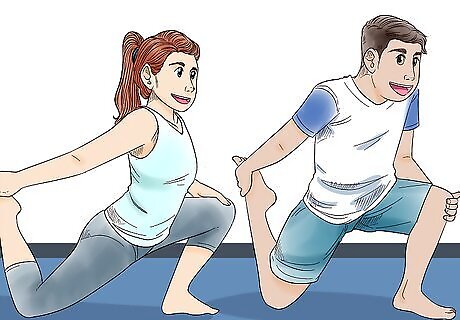
Take a class or pursue a new hobby. Trying something new can be exciting! It can also provide you with opportunities to connect with potential dates who share similar interests. You never know who you might meet! For example, you could check out a yoga or aerobics class at your gym or take an evening painting class at a community college.
Making a Meaningful Connection

Prioritize your deal breakers. It's important not to settle, but consider reevaluating the characteristics you're looking for in a partner. Things that may have been deal breakers in the past might not seem as important now, and you have a better chance of forging a meaningful connection if you shift your focus to things that really matter to you. Be upfront with people about your deal breakers, and enforce those boundaries. For example, if you don't want a partner that drinks excessively, stop seeing someone if you notice this behavior. Don't expect someone to change for you. For instance, try putting less emphasis on finding someone who meets your physical ideal. Instead, look for partners who share your values, life goals, and political or religious views. It's more likely that potential partners in their 30s already have children. This may have been a deal breaker in your 20s, but try looking at it differently now.

Approach dating like you would a friendship. Aspire to really to get to know someone and enjoy spending time with them before imposing too many expectations. Looking at them as a friend rather than a potential love interest can give romantic relationships space to evolve naturally. For instance, would you be angry if your friend didn’t call or text you back right away? Probably not.

Look for someone with a lifestyle similar to your own. Sharing a similar lifestyle can help you relate to your potential partner in a deeper, more meaningful way. You'll also have more to talk about on a day to day basis, allowing you to connect more frequently. You can typically identify someone's lifestyle by inquiring about their career, religion, political views, hobbies, and family life. If you're working hard to fast track your career, you're probably working long hours. Look for a partner who can relate to your position and values their career as much as you do. If your religion plays a large role in your life, consider looking for partners at your church or temple. If you have children, consider dating someone who also has children and understands situations that you're going through. Pay attention to their parenting style and relationship with their ex, however. This can tell you if the two of you will be compatible parents or if you may have issues in the future.

Work on your communication skills. Communication is the backbone to any strong relationship. To make a meaningful connection, it's important that both parties are able to talk openly and honestly with each other. If you're feeling out of touch with your feelings or if you just want to brush up on your communication skills, you might try: Journaling daily about your thoughts and feelings Engaging your friends in deep conversation Asking and noticing how people around you are feeling. Listening to others rather than just waiting for your own turn to speak

Move on if you don’t click with someone. Whatever you do, don’t feel like you need to settle! The less time you spend trying to make something work with a bad match, the more time you have to find the person you truly want. If you don’t click with a potential partner within the first few dates, try looking elsewhere. If you find yourself working too hard to accept someone, then they likely aren't the right person for you.
Navigating Family and Baggage
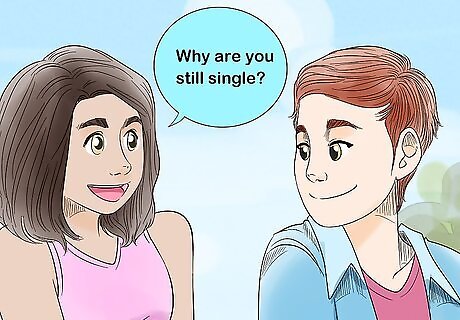
Get ready for the "why are you still single?" question. Whether it's asked flirtatiously or seriously, many thirty somethings encounter this question during the dating process. It's not a bad thing to be asked this, but be prepared with an answer so you aren't caught unaware. Rehearse what you want to say ahead of time so that it'll be easier to share when the time comes. Keep things short and superficial at first. Once you've grown to trust someone, you can share the full story with them. There are many reasons why people in their 30s are still single! Understanding why you're single right now can help you address your needs and approach dating with a new perspective. If you feel that you can't work through your issues alone, consider speaking with a therapist or close friend about your feelings.

Heal from your divorce or last relationship. If you recently got a divorce, don't feel that you have to jump back into dating immediately. Give yourself time to heal before putting yourself out there again. If you start dating someone who was recently divorced or who's still in the middle of a messy divorce, you may want to ask them if they're truly ready for a relationship. You could say, "Your divorce was pretty recent -- I can sympathize! I've been divorced, too. If you don't feel ready for a serious relationship with me yet, I will totally understand."

Tell them early on if you have children. Be upfront about your children on the first date, or possibly even before the first date if you're already communicating with the person. Your potential partner will appreciate knowing this crucial fact. Whatever your role is in your children's lives, it's important that you're honest about them. You could say, "I just want you to know that I have a beautiful toddler named Macy. She's very important to me." Or you could try, "I should tell you that I have a young child from a past relationship. He lives with his mother in another state, so I don't see him often. He's a great kid!" Be proud that you have children! Don't waste your time on a partner who considers children to be a deal breaker. Don't feel that you have to introduce your dates to your children right away. It's better for your kids if you only introduce them to serious or potentially long-term partners. Kids easily attach to people, and it could be traumatic for the children if you break up.

Avoid speaking bitterly about past relationships. Most people have had at least one major relationship go south by the time they've hit their 30s -- probably more than one. Don't let negative situations from your past haunt the present, though! Avoid talking nonstop about your messy divorce or the girlfriend who cheated on you. Make it clear you're ready for something new. You should also pay attention to how they talk about their past relationships to watch for red flags. When you meet someone new, give them a chance! Don't let the past dictate your present or future. This applies to comparing this relationship to past relationships. For example, don't expect your new mate to do things that your ex did, such as always bring you flowers. Not only does this set an unreasonable expectation, but it can also cause the new partner to pretend to be the person you want. If you don't feel that you can get past a previous relationship, consider working through your feelings with a therapist before you start dating.













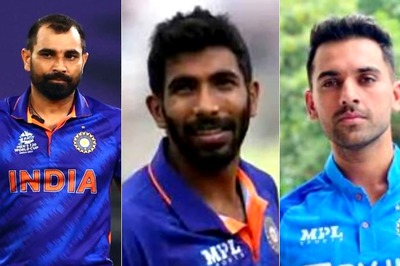



Comments
0 comment